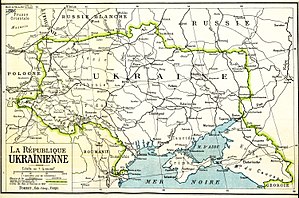Ukrainian irredentism
This article or section may fail to make a clear distinction between fact and fiction. (February 2019) |
This article's factual accuracy is disputed. (February 2019) |


Ukrainian irredentism refers to claims made by some Ukrainian nationalist groups to territory outside of Ukraine which are considered part of national homeland.

History[]
Rise of nationalism[]
The 10 commandments of the Ukrainian People's Party (1902–1907) were developed by Ukrainian nationalist, the leader of UPP Mykola Mikhnovsky in 1904. These commandments were kind of honor code for the party. They called for a one, united, indivisible, from the Carpathians to the Caucasus, independent, free, democratic Ukraine – a republic of working people.[1]
Claimed regions[]
Since Mikhnovsky the idea of ‘Ukrainian Independent United State’ (Ukrainian: Українська Самостійна Соборна Держава Ukrainska Samostiyna Soborna Derzhava) has been a key nationalist slogan, but many would argue that the ‘unification’ (соборність sobornist’) of Ukrainian lands was partially completed in 1939–45.
Today’s would-be Ukraina irredenta is mainly in the east, on the territory that is now part of the Russian Federation:[2]
- Starodub region north of Chernihiv
- South-eastern parts of Voronezh, Kursk and Rostov oblasts
- Kuban region
In the west, some radical nationalists would also cover the following territories:[2]
- Transnistria, the disputed left bank of the Dniester in Moldova
- Prešov region in north-eastern Slovakia
- Zakerzonia (Chełm and Przemyśl) in south-eastern Poland
- Brest region in south-western Belarus
- Southern Bukovina and the area around Maramureș in northern Romania
Ukraine seriously claiming territories of neighbouring states is not considered possible.[2] (Foreign claims against Ukrainian territory[2] have been acted on in the Russian Federation's 2014 annexation of Crimea, its covert military support of separatism in the Donbas region, and aggressive rhetoric by the Russian government.)[3] In the case of Russian–Ukrainian conflict, radical Ukrainian nationalists could try to take advantage in the north Caucasus or elsewhere.[2]
Kuban[]

| 90-75% 75-50% 50-25% | 25-10% 10-5% 5-2% |
Ukrainians first settled the Kuban in 1792 and until the mid-twentieth century the majority of the population there identified themselves as Little Russians or Ukrainians, however the percentage of those who identified themselves as Ukrainians dropped from an official 55% (1926) to 0.9% (2002).
See also[]
- Greater Russia
- Greater Romania
- Greater Bulgaria
- Greater Moldova
- Greater Hungary
References[]
- ^ (in Russian) Мирчук П. Возрождение национальной идеи. — Киев: Украинская издательская спилка, 1999
- ^ a b c d e Andrew Wilson, Ukrainian nationalism in the 1990s: a minority faith, Cambridge University Press, 1997, pp. 181–183
- ^ "Putin's Ukraine rhetoric driven by distorted view of neighbour". the Guardian. 2021-12-07. Retrieved 2021-12-12.
- Ukrainian irredentism
- Nationalist movements in Europe
- Politics of Ukraine
- Ukrainian nationalism